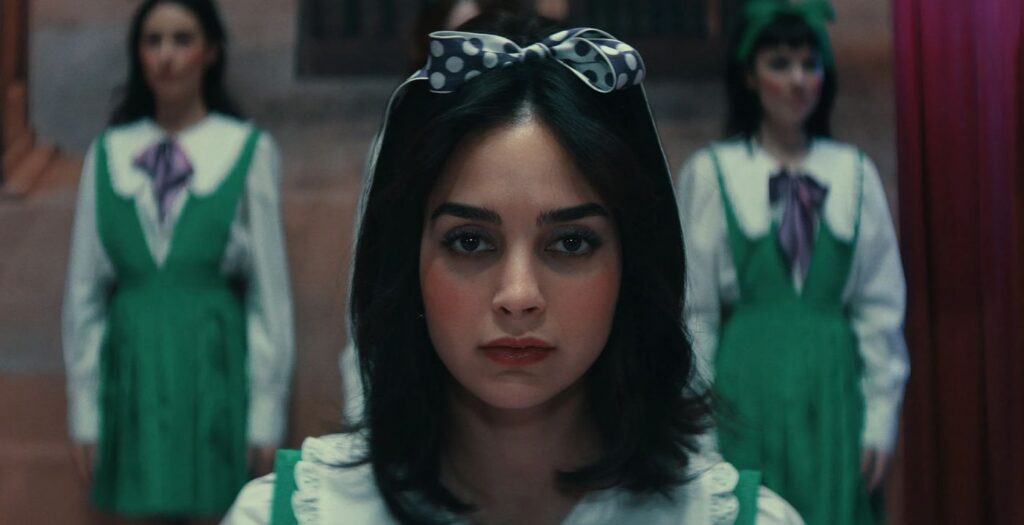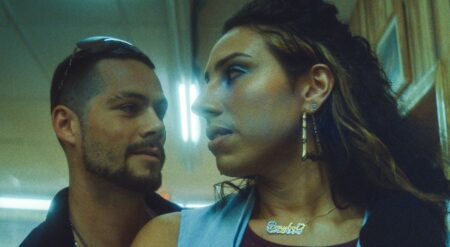At Sundance, Your Monster blew me away. Written and directed by Caroline Lindy, the film is a weird, dark, and fantastical tale led by Melissa Barrera as Laura. To put it nicely, Laura is soft-spoken and, to be quite frank, a doormat. But one day, when she’s at her lowest, crying every day after a life-saving surgery while also grieving a relationship, Laura finds the Monster (Tommy Dewey) living in her closet. At first, he wants her out, and then it turns into something more. As she falls in love with the Monster, she releases everything she has held inside. Every bit of rage, every bit of pain that she was taught to keep bottled up and ignored.
Laura is a cathartic character, and with a killer finale, Your Monster is a film that everyone who has struggled to push back needs to watch. An indie film that uses ingenuity and creativity at every single turn, it’s sublime. Love your monster, embrace your monster, let it out. We spoke with Caroline Lindy now that the film is available on VOD and dove into what exactly the story meant to her personally and what she wants every woman to take away from the story.
Your Monster’s core is feminine rage. It’s the anger women are told to hide, to throw away. It’s the anger we push aside and let ourselves acquiesce and compromise to support the people (and men) around us professionally and personally. Laura has lost that anger and fight. Through her romance with Monster, she starts to get it back.
When asked about the unique choice to tell a story centered on an emotion women are often reviled for as a romance, Lindy had a lot to say. “I wanted the relationship between lore and monster to reflect the real experience that I went through when I developed a relationship with my own anger,” Lindy started, “which was initially with my own monster.”

Instead of rage, women often feel shame and rethink everything about themselves. This was an experience that Lindy tapped to tell Laura’s story in Your Monster. Lindy continued, “I was afraid and ashamed of that side of myself. But as I got to know it, I realized that my monster is the part piece of me that I can use as a tool to protect myself and identify pieces of my life that are toxic and are hurting me and help me get rid of them.’ [My monster can] fill me with strength and empower me. And I eventually learned that and started loving that side of myself.”
She continued, “When creating the character of Monster, I realized that we have to see the beauty in him. We have to see the charm in him. We have to be able to fall in love with this character. Because if we can’t fall in love with him, then we can’t see why someone would fall in love with their own rage.”
In creating Monster, complexity was a pillar for Lindy, “It was really important to me to show a multi-faceted character in Monster. It was beautiful and cathartic for me, too, because we, as women and many people in general, are so ashamed of the darker, louder, less restrained pieces of ourselves. Actually, we should share that side of ourselves more. I think the world needs to see the angry woman because we all know the angry man, but we’re less familiar with the angry woman and what she’s capable of.”
Your Monster enters an evolving cinematic landscape that pushes against women being asked to be perfect victims while also allowing women to have complexities and sharp corners. More and more, women’s rage is becoming vital. We asked Caroline Lindy how she felt about contributing to this conversation and how it felt to center feminine rage in her film.
Anger is a nuanced conversation, of course. Left unbridled, it festers and causes pain, as shown throughout history. But at the same time, the rage that men feel is never checked nor balanced, especially those with systemic power. That said, for those who have been taught to make themselves smaller and allow boundary transgressions to keep the peace, anger is a vital tool to carve out the toxicity and pain committed against them.

Anger can move mountains and liberate a woman like Laura. Reaching into her sadness and pulling out the rage, Laura reclaims her life. That is the heart of Your Monster as a story. But to highlight that, the Monster can’t be one-note. He has to have complexity and depth, as do the emotions we feel.
“I think it’s really exciting,” Lindy began, “That’s the most wonderful thing about independent filmmaking. You can showcase new types of characters in ways that maybe you wouldn’t be able to do in a studio system, and you can experiment and have fun. I think, especially when talking about this angry woman, we, as a society, reward men, or we look to them as leaders. If we see men being angry, we respect them for speaking out, being loud, and speaking up when they see situations that need to be changed. But with women, we demonize them for that and punish them for the same thing.”
Lindy continued, “Anger enacts change in your own life and can help others. I think we should stop looking at anger and anger in women specifically as something to punish or something to cast as crazy. We should get more comfortable seeing the angry woman as someone powerful, an active player in their own life, and unwilling to let bad things happen to them. For me, putting an angry woman in a spooky rom-com world was a really great way to lightly offer this character to the world in a way that was palatable.”
Your Monster is a cathartic, genre-bending film, and it’s clear from speaking with Caroline Lindy that it’s powerful, too. Anger is complex, and in some cases, it can be your lover, protecting you when you need it and giving you the strength to move forward.
Your Monster is available now on VOD.







